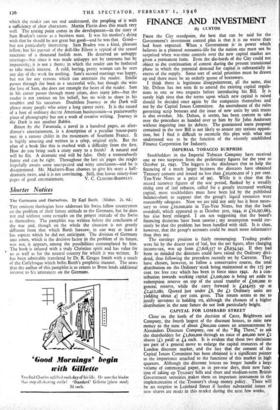FINANCE AND INVESTMENT
By CUSTOS Film the City standpoint, the best that can be said for the Government's investment control plan is that it is no worse than had been expected. When a Government is in power which believes in a planned economic-life for the nation one must not be surprised when war-time controls over the new capital market are given a permanent form. Even the die-hards of the City could not object to the continuation of control during the present transitional phase in which the potential demand for capital is substantially in excess of the supply. Some sort of social priorities must• be drawn up and there must be an orderly queue of borrowers. I think there is legitimate disappointment, all the same, that Mr. Dalton has not seen fit to amend the existing capital regula- tions in one or two respects before introducing his Bill. It is surely high time that the terms upon which new capital is raised should be decided once again by the companies themselves and not by the Capital Issues Committee. An amendment of the rules governing scrip bonuses and the issue of new units by unit trusts is also overdue. Mr. Dalton, it seems, has been content to take over the procedure as handedover to kiln by Sir John Anderson without inquiring into its defects. The guaranteed loans proposal contained in the new Bill is not likely to arouse any serious opposi- tion, but I find it difficult to reconcile this plan with what one understood was to be the function of the recently established Finance Corporation for Industry.
IMPERIAL TOBACCO SURPRISE
Stockholders in the Imperial Tobacco Company have received one or two surprises from the preliminary figures for the year to October 3-I, 1945. The biggest is the disclosure that to help the financing of a much larger business the directors have obtained Treasury consent and issued no less than £io,000,000 of 3 per cent. Ten-Year Notes at a price of 991. While it is clear that the record turnover figures of the war period, flanked by a steadily rising cost of leaf tobacco, called for a greatly increased working capital, most stockholders must have been led. by the published balance-sheet to suppose that the group's liquid resources were reasonably adequate. Now we are told not only has it been neces- sary to issue Lio,000,000 in Ten-Year Notes, but that the bank overdraft, which appeared as at 'October 31st, 1944, at £10,297,663, has also been enlarged. I am not suggesting that the board's financing decisions have been unwise ; my assumption would cer- tainly be that the problem has been handled with skill. It. is clear, however, that the group's accounts could be much more informative than they are. The earnings position is fairly encouraging. Trading profits were hit by the dearer cost of leaf, but the net figure, after charging income-tax, was up from £7,628,557 to £8,934,345. If they had been so minded the directors could have raised the Ordinary divi- dend, thus following the precedent recently set by Carreras. They have chosen, however to follow a conservative course, the total distribution on the Ordinary-stock being maintained at the 171 per cent. tax free rate which has been in force since 1941. As a con- tributiOn towards working capital £i,000,000 is being set aside to redemption reserve on top of the usual transfer of £50o,00o to general reserve, while the carry forward is L424,055 up at L2,412,080, •Quoted just under £8, the LI Ordinary units are yielding, =about 41 per cent. gross. This return seems to me to justify investors in holding en, although the chances of a higher distribution. in the near future do not look particularly bright.
- CAPITAL FOR LOMBARD STREET Close on the heels of the decision of Cater, Brightwen and Company, the fourth largest of the discount houses, to raise new money to the tune of about £600,000 comes an announcement by Atexanders Discount Company, one of the " Big Three," to ask the shareholders for £1,600,000 through an issue of 400,000 new £2 shares (£1 paid) at £4 each. It is evident that these two decisions are part of -a general move to enlarge the capital resources of the London discount market, and the fact that the consent of the Capital Issues Committee has been obtained is a significant pointer to the importance attached to the functions of this market in high quarters. Although the discount houses no longer handle a large volume of commercial paper, as in pre-war days, their new func- tion of taking up Treasury bills and short and medium-term British Government securities makes them an important instrument in the implementation of the Treasury's cheap money, policy. There will be no surprise in Lombard Street if further substaniial issues of new shares are made in this market during the next few weeks.


























 Previous page
Previous page